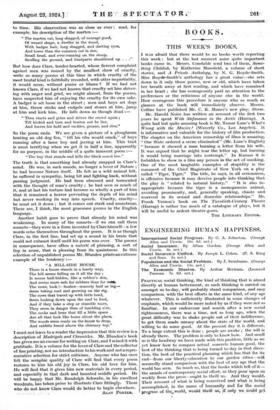BOOKS.
THIS WEEK'S BOOKS.
I was afraid that there would be no books worth reporting this week ; but at the last moment some quite important
books came in. Messrs. Constable send two of them, Some- thing Childish, by Katherine Mansfield, a volume of short stories, and A Private Anthology, by N. G. Royde-Smith. Miss Royde-Smith's anthology has a great value=she sets down in it only those poems, new or old, which have taken her breath away at first reading, and which have remained in her heart ; she has courageously paid no attention to the preferences or the criticisms of anyone else in the world. How courageous this procedure is anyone who so much, as glances at the book will immediately observe. Messrs. Collins have published Mr. C. K. Munro's new play, Storm.
Mr. Harold Noice has written an account of the first two years he spent With Stefansson in the Arctic (Harrap). A quite bad but quite amusing book is Mr. Tamar Lane's What's Wrong with the Movies ? (Waverly Co., Los Angeles). It is informative and valuable for the history of film production. The chapter on the American censorship of films is amazing. " One State ordered a scene eliminated" (Mr. Lane's English) " because it showed a man burning a letter from his wife. It was argued that he might tear the letter up, but burning it would bring marriage into contempt." In Kansas it is forbidden to show in a film any person in the act of smoking. One of the most laughable examples of stupidity is the comment of the Chief- Magistrate .of New York on a play called " Tiger, Tiger." The title, he says, in all seriousness, is offensive because it may deceive people into thinking that the play is " related to natural history." " It is also in- appropriate because the tiger is a monogamous animal, avoiding promiscuity, and, generally speaking, chaste and reserved in its sexual and domestic relationships." Mr. Frank Vernon's book on The Twentieth-Century Theatre (Harrap) is rather too much of a catalogue of plays, but it will be useful to ardent theatre-goers.
THE LITERARY EDITOR.


































 Previous page
Previous page